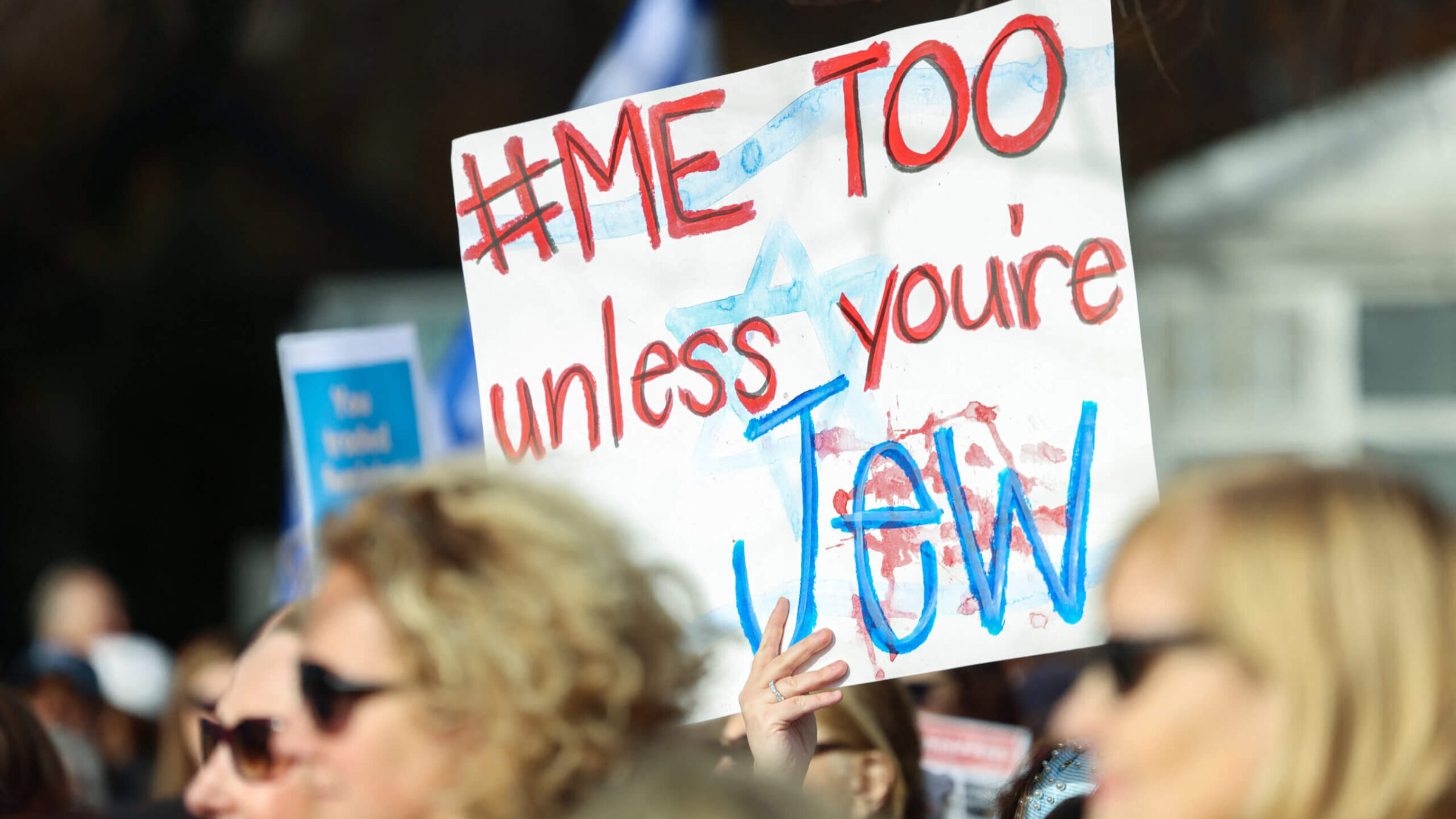The UN confirmed Israelis experienced sexual violence on Oct. 7. Why is it so hard for the world to believe?
Recent questions about a bombshell New York Times investigation are being used to cast doubt on the veracity of rape allegations

Demonstrators gather during a protest outside of United Nations headquarters in New York City, accusing the international rights group of staying silent over alleged rapes of Israeli women committed by Hamas militants, Dec. 4. Photo by Charly Triballeau/AFP via Getty Images
For a brief moment at the end of last year, it seemed as though the debate over the use of rape on Oct. 7 could finally be put to rest. An exhaustive report published by The New York Times in late December announced that it had “uncovered new details showing a pattern of rape, mutilation and extreme brutality against women in the attacks on Israel.”
Yet even though the United Nations yesterday released a report declaring there are “reasonable grounds to believe” accounts of rape and sexual assault on Oct. 7, somehow we’re still encountering the same old conspiracies about whether Israeli women were really subject to horrifying sexual violence — except they’re getting even more pernicious.
For months, those conspiracies have centered on the Times investigation. Almost as soon as it was published, pro-Palestinian commentators began to seize on details to try and debunk its findings. Most recently, a piece from The Intercept last week cast doubt on whether the Times “presented solid evidence to support its claim that there were newly reported details ‘establishing that the attacks against women were not isolated events but part of a broader pattern of gender-based violence on Oct. 7.’” Some activists and media critics have suggested the story discredited the investigation as a whole.
Never mind that The New York Times was neither the first nor the only publication to find evidence of sexual assault on Oct. 7. One of the first allegations appeared the day after the massacre in Tablet; several weeks after the Times investigation, The Guardian ran a piece of its own. Human rights organizations like Human Rights Watch — long critical of Israel — have indicated that there are reasons to believe that sexual assault occurred on Oct. 7. Additionally, there have been subsequent reports of sexual abuse from hostages who were held in Gaza, which the U.N’s new report described as “clear and convincing.” Even The Intercept did not deny that sexual assault occurred on Oct. 7, noting that it was unquestionable that sexual assault is common in war.
As both a survivor of gender-based violence and a certified rape and domestic violence counselor, a part of me has to wonder what purpose the distinction The Intercept heralds serves. Debating whether Hamas militants entered Israel with a plan to sexually assault their victims, or simply chose to do so in the moment, seems as pointless as debating whether Gazans are starving because Israel has prevented aid from reaching them or because Hamas is withholding it from civilians. People in Israel were raped and murdered. People in Gaza are on the brink of famine. There is so much misery within Israel-Palestine that debating the specifics — particularly with an eye toward discrediting the claims of people who are very clearly suffering — seems bleak and inhumane.
The first cracks started to show in the Times story after a relative of one of the women mentioned posted on Instagram to object to that woman’s categorization in the story as a victim of sexual violence; this was held up as proof that the entire story was nothing but an extended fabrication. Then, the credentials and controversial social media “likes” of Anat Schwartz, an Israeli film director who did a significant amount of reporting for the piece, began to come under fire, culminating in the investigative story from The Intercept that is being widely held up as definitive proof that Israelis weren’t raped. The Times told the New York Post in a statement that Schwartz’s “‘likes’ are unacceptable violations of our company policy. We are currently reviewing the matter.”
It’s fair to voice concerns about the process by which the Times went about reporting this investigation. But it’s not fair to treat the investigation from The Intercept — which is not an example of war reporting, but rather a media story — as proof that sexual violence didn’t happen. Yet for those who refuse to see Israelis as potential victims, the undermining of the credibility of the Times’ piece necessarily cascades into an undermining of the claims of assault.
If the way the paper of record reported on sexual violence was imperfect, then all of the accounts of rape and violation on Oct. 7 must be lies. If the Israeli government has ever used stories of rape as pro-war propaganda, then all stories of raped Israelis — even ones that come from civilians rather than the government — are inherently suspect.
A common refrain of those doubtful of the sexual violence Israeli women experienced on Oct. 7 is that it is important to debunk false rape claims because the specter of the violent Arab rapist has been used to justify Israel’s genocidal campaign in Gaza. But to recognize that rape occurred — as, again, even The Intercept does — is not to throw support behind the suffering of Gazans. Nor does it require denying or disbelieving the Palestinians who have come forward with their own sexual assault allegations against the IDF. One can simply recognize that rape — on Oct. 7 and beyond — is just one more form of trauma and suffering that has occurred in the midst of an ugly and horrific war.
It is clear that the Times made errors in pursuing its report on sexual violence on Oct. 7. At a bare minimum, that disheartening fact is a reminder of how important it is to perform due diligence, and hold reporters writing about sexual assault and war crimes to the highest possible standards, if only to protect the subjects of the piece from harassment and re-traumatization.
But it is important to remember that even during peacetime, rape investigations are a fraught and complicated process that rarely result in straightforward answers.
Tragically, most of the people who were violated on Oct. 7 will never be able to provide their own testimony or speak to their experiences, because all available evidence suggests that the vast majority of them are dead. It is deeply disturbing that even in death, rape victims are being put on trial to prove their violation.

















